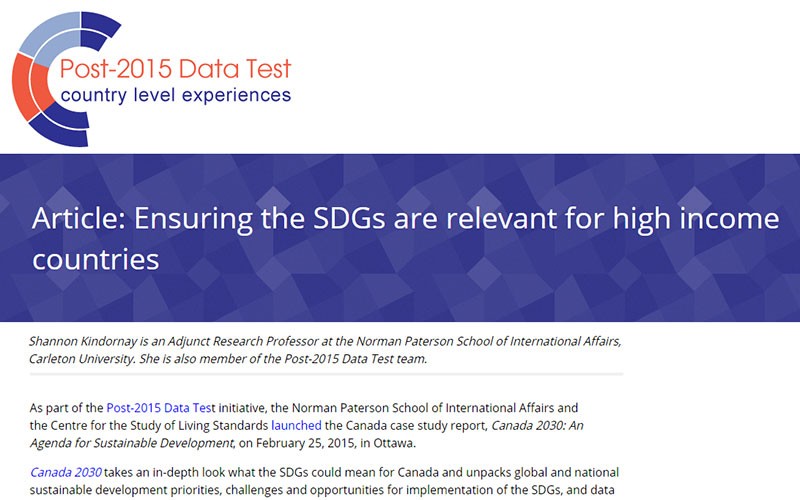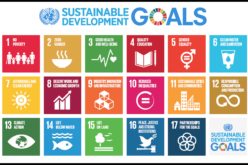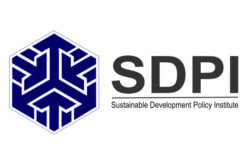As part of the Post-2015 Data Test initiative, the Norman Paterson School of International Affairs and the Centre for the Study of Living Standards launched the Canada case study report, Canada 2030: An Agenda for Sustainable Development, on February 25, 2015, in Ottawa.
Canada 2030 takes an in-depth look what the SDGs could mean for Canada and unpacks global and national sustainable development priorities, challenges and opportunities for implementation of the SDGs, and data availability for measuring progress. The report makes a number of valuable contributions. First, it serves as a comprehensive overview of Canada’s sustainable development challenges, broadly understood in terms of economic, social and environmental well-being. Second, the report takes stock of the current state of Canada’s national statistical system and data availability for monitoring progress on the SDGs. Finally, the report provides a concrete example of how a universal, country relevant sustainable development agenda could be applied to high income countries.
The report raises a number of important implications for the SDG framework.
- A universal post-2015 sustainable development agenda that allows for country differentiation can be meaningfully applied to high income countries. For the seven candidate SDG areas examined in the study – poverty, education, employment and inclusive growth, energy and infrastructure, environmental sustainability and disaster resilience, governance and global partnership – the research team found a high degree of correlation between the global goals and Canadian sustainable development challenges. However, targets and corresponding indicators may need to be adjusted to ensure relevance in high income countries.
- As I have argued elsewhere, while the SDG framework may resonate in high-income countries, a key challenge will be getting domestic stakeholders engaged. The Canada case study reveals a need to move the domestic conversation beyond the federal government. Ensuring that the universal framework resonates across countries with different levels of development requires input from countries based on their domestic experiences.
- Ongoing efforts at the national and sub-national levels should serve as the basis for establishing post-2015 roadmaps across countries. It is clear that many policies and strategies that address key elements of the post-2015 agenda exist across different levels of government in Canada. As countries move toward national implementation of the SDG framework, the SDGs should leverage existing plans and initiatives and build on past successes. Ensuring that the SDG framework allows country differentiation will be important in this context.
- Global minimum standards may not be particularly relevant for high-income countries but could guide development cooperation efforts going forward. Global minimum standards have the potential to play a critical role in galvanising efforts to address key global challenges. Development partners should consider ways to make the realization of global minimum standards a central part of activities carried out under the global partnership for sustainable development.
- Contributions to global partnership can and should be measured at the country level. Historically, commitments related to global partnership have been measured at the global level. Moving forward, post-2015 presents an opportunity for measuring commitments to global partnership at the country level, as the Canada case study reveals. Such an approach could strengthen global monitoring and follow up by tracking countries’ individual contributions.
Governments are now in the thick of post-2015 negotiations. There is no question that ensuring that the SDGs are truly universal will require buy-in from high income countries. High income countries have a key role to play in the realisation of the SDGs in developing countries, and in addressing global public goods challenges. However, the universal agenda requires moving beyond the traditional role of high income countries as funders of sustainable development abroad to addressing sustainable development challenges at home. Canada 2030 provides a concrete example of what this might look like in practice.
Shannon Kindornay is an Adjunct Research Professor at the Norman Paterson School of International Affairs, Carleton University. She is also member of the Post-2015 Data Test team.
(Reblogged from www.post2015datatest.com )
1,543 total views, 1 views today










